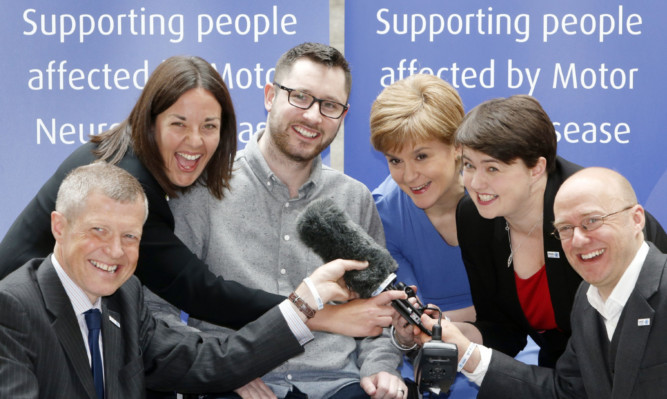Gordon Aikman is dying.
“The odds are stacked against me,” he admits.
But the 30-year-old Fifer is not giving in without a fight.
“The most important thing is finding a cure,” he adds.
It’s more than four months since The Courier first caught up with Gordon at his home in Edinburgh to hear the inspirational story of his battle with terminal Motor Neurone Disease (MND).
At the core of his high profile ‘Gordon’s Fight Back’ campaign has been demand for better care and raising cash to find a cure for MND.
Now Gordon hopes that the BBC Scotland documentary ‘The Fight of Gordon’s Life’, screened on the evening of Monday January 4, will provide a further boost to his campaign which has already raised an impressive £420,000.
Since being diagnosed with the incurable neurological condition in the summer of 2014, aged just 29, Kirkcaldy-born Gordon’s achievements have been remarkable.
In the face of a cruel, creeping, relentless death sentence, he has raised the massive funds whilst raising awareness of the illness. He convinced the Scottish government that the NHS, rather than charity, should fund a team of specialist MND nurses and double their number to 12.
He had a day to remember last year when he brought family and friends together to celebrate his marriage.
But as he continues losing control of his body, and creeps towards an untimely young death, perhaps it’s the struggle to carry out what were previously straightforward everyday tasks which are the most heart breaking to hear about.
In the documentary, produced after BBC cameras followed him throughout 2015, the former Better Together political campaigner revealed the moment when he almost died trying to open the curtains.
And speaking to The Courier just ahead of its screening, Gordon told The Courier that this incident was a “wake up call” to his deteriorating condition.
“I was using my teeth to open the curtains, biting them and using the power in my wheelchair to pull them open, “ he says.
“I went over the side of my wheelchair and my head was just inches from the floor.
“I thought it was such a c**p way to die, so I knew I had to check myself on the floor so I could breathe. But then my feet and legs got tangled up in the wheelchair and that cut off the blood supply to my legs. I was trying to shout out the door, but no one was coming.”
Gordon lay there helpless for five hours. It was the most alone he’d ever felt.
“I was an absolute mess when they found me. I was sobbing, delirious and I had been sick. Something that used to so straightforward put me in hospital for a week. It’s amazing what goes through your mind when you are lying on the floor like that. I thought this was it.”
Throughout 2015, the physical condition of the former Scotland squad and Kirkcaldy Gymnastics Club member deteriorated.
And things will get worse. Eventually he will lose complete control of his body and life will be cut short.
Since last speaking to The Courier in August, Gordon can no longer feed himself and is now 100% dependent on his electric wheelchair. He increasingly uses a ventilator to help him breathe.
“Things are getting more and more difficult for sure, “he says.
His “worst fear” remains the day when MND robs him of his ability to speak and he suffers the indignity of “locked in syndrome”when his body shuts down and his still active mind becomes “trapped in a shell”, as he puts it.
“I think that would be incredibly difficult,” he says. “So, not only are you paralysed, unable to move, you’re then suddenly not able to communicate and speak.”
As an insurance policy, Gordon has banked speech samples with an Edinburgh University team who are developing a voice synthesizer.
He has yet to decide whether to get a tracheostomy in preparation for the day when he might rely on a machine to breathe for him, potentially extending life by years.
He remains incredibly positive despite the degenerative prognosis. He hopes he has years left rather than months.
His inspirational example has been widely recognised. His awards include the British Empire Medal, an honorary doctorate from Edinburgh University and the Public Campaigner of the Year title at the Scottish Politician of the Year Awards.
And yet Gordon insists it’s not about him.
He adds: “I just felt I had to do something. Doing what I can whilst I can. It’s too late for me but no MND sufferer should have to go through this.”
To donate to Gordon’s Fight Back, go to
https://www.justgiving.com/gordonaikman/
